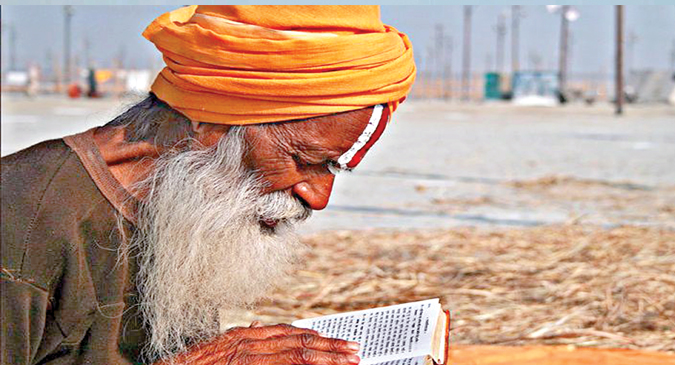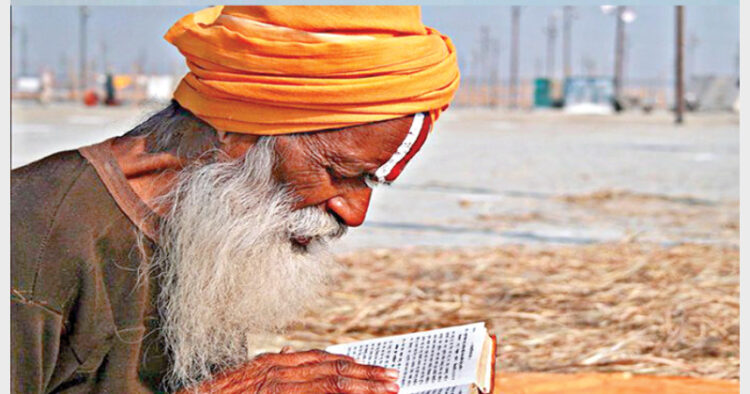The ancient Indian knowledge system is reverberating internationally. It is time to celebrate it locally and shun our skepticism of it
Mayank Gupta
The revival of the theme, ancient Indian wisdom, has provoked much controversy in India. Why not read the first line again? Indeed, what deserves our attention and appreciation has been reduced to criticism, thanks to the mainstream media of the country. Have we failed in recalling that we are the descendants of those who made India the world’s richest economy for a long stretch in history that eventually fell to the excesses of foreign invaders, from Mughals to the British? What enabled the then India and its inhabitants rule the world? The answers lie in the contemporary settings, we only need to pay heed to certain facts.

Two global giants in oral care, Colgate Palmolive and Unilever, wasted no time in grasping the market forces. Capitalism is underpinned with demand and supply stats, and this forced the two multinationals to take a plunge into herbal products in order to stay afloat in the fast-moving goods market that has been disrupted by India-based Patanjali. Colgate came up with Vedshakti and HUL named its new toothpaste Ayush. FMCG giant, Amway, followed suit and launched its herbal oral care product in the domestic Indian market that the company says is a bestseller worldwide. What is compelling companies to adopt the natural and Ayurveda based solutions in their portfolio? The answer lies in preceding lines. Read the names again- ‘Vedshakti’ and ‘Ayush’. Derived from Sanskrit language, the names in themselves are evidence of growing appreciation of ancient Indian wisdom at the global level.
Here’s another incident. Dalai Lama, a Nobel-laureate and one of world’s most dominant personalities, has advocated for inclusion of ancient Indian knowledge in the education system of India. While delivering a speech in late 2017, he stressed on how he himself and many others have learnt from India’s rich texts and went as far as terming Indians as his gurus, reducing himself to a disciple. The spiritual leader, who found refuge in no other country but India from atrocities inflicted on his people by China, praised ancient India’s repository on cosmology, psychology and physics, besides mentioning the pluses of ‘Shanta’ and ‘vipassana’ in his lecture. And finally, his evoking a point that India must serve as an example to the tumultuous world of today, with respect to social harmony and tolerance, met with applause from the audience.
But there is something wrong somewhere. Else, the invoking of ancient India’s knowledge systems by the leaders of today would not have drawn criticism and mockery from the press and intelligentsia. Agreed, any mindless, unjustifiable extrapolation of Indian texts must be discouraged. However, at the same time, dancing to the tunes of the West, that would never allow India’s knowledge to gain a hegemonic position in today’s world, is nothing but reducing ourselves to being perpetual slaves of the first-world countries.
Why not consider more facts. The world is adopting veganism like never before and data establish that the number of vegans in the West is rising. India’s ancient texts and customs talk extensively of how non-human life is as worthy as humans. Animal welfare and environmentalism form the basis of the West’s pledge towards veganism; a study indicates that one-third of Britons have quit meat. The weak link is that the same study points out that every 2 in 3 Indians consume meat. What can this be attributed to? Indeed, to our education system’s inclination towards modern sciences and high disregard for country’s own rich heritage. The irony is that while the West is adopting our systems to the benefit of their people and land, Indians still remain sceptic. However, the silver lining is that the trend is gradually changing and the recent strides made in the fields of Ayurveda and Yoga hold positive signs.
The list is never-ending. Heard of Arnold Schwarzenegger, the actor, politician and of course professional bodybuilder? The legend has admitted to incomparable benefits he derived by practicing transcendental meditation, a form of mantra meditation that helps reduce stress and anxiety. Numerous international personalities, from the fields of politics to glamour, swear to Yoga and meditation as their way to lead a healthy and stress-free life. To those who are unaware, Yog is a Sanskrit language word and the practice of Yoga originated in ancient India with Rig Veda, Upanishads and other texts containing rich mention of the subject. UNESCO has recognized the practice as intangible cultural heritage.
The world has been embracing our ancient knowledge base with open arms. You may recall Steve Jobs, the founder of world’s most iconic brand Apple, mentioning his visit in the 1970s to the Kainchi Dham Ashram in northern India. Jobs even recommended a pilgrimage to another tech entrepreneur, Mark Zuckerberg, the founder of Facebook. The list is not exhaustive and includes Larry Page (of Google) and Jeffrey Skoll (of eBay). The spiritual heritage of India has attracted world’s great minds and innovators and this in itself serves as an inspiration to those born in the spiritual capital of the world, India.
Yet, much needs to be done locally. India’s education system has to be rethought to give precedence to India’s rich ancient knowledge over late discoveries and inventions. Glorification of Western culture to the extent that it vilifies local customs and traditions has only served as a deterrent to India’s socio-economic development. It is time Indians take pride in the Battle of Saragarhi, the Iron pillar of Delhi, mention of zero in the Bakhshali manuscript, Brahmagupta’s use of algebraic abbreviations, the medical works of Sushruta and Charaka and numerous other distinguished works. The ancient Indian knowledge system is reverberating internationally, it is time to celebrate it locally and shun our skepticism of it.














Comments